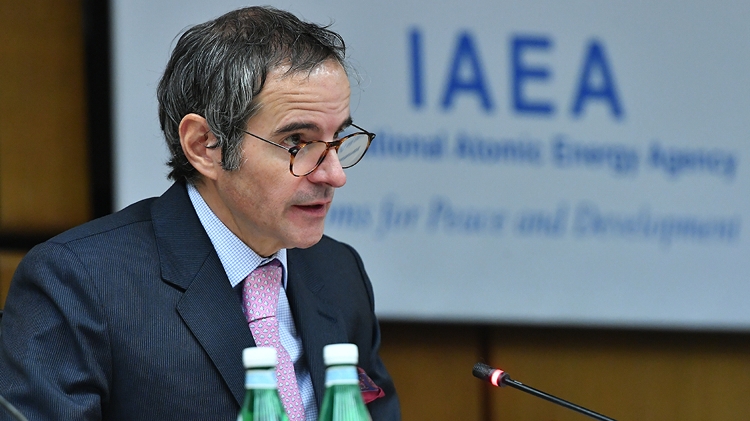IAEA head visits Netherlands to attend 26th World Energy Congress
“When it comes to energy, the energy debates, nuclear is back. Nuclear has enormous promise,” the Director General told the students.

The IAEA Director General held his first official visit to the Netherlands this week, talking with ministers, industry, students and scientists about the future of nuclear power and taking part in the 26th World Energy Congress.
As well as meeting the Deputy Prime Minister and Minister for Energy and Climate Policy, the Director General also spoke with the Minister for Medical Care Pia Dijkstra, Minister for Environment Vivianne Heijnen, and Annemiek van Bolhuis, Chair of the Board of the Authority for Nuclear Safety and Radiation Protection (ANVS).
Mr Grossi visited the Reactor Institute at the Delft University of Technology and spoke with students to share his vision on nuclear safeguards, politics, international development and gender, inspiring young people to join the nuclear industry. “When it comes to energy, the energy debates, nuclear is back. Nuclear has enormous promise,” the Director General told the students.
Watch the Director General's full talk to Delft students here.
The Netherlands currently has a power reactor at Borssele, three research reactors and four fuel cycle facilities. At the IAEA’s recent Nuclear Energy Summit in Brussels, the Prime Minister of the Netherlands Mark Rutte emphasized the country’s commitment to nuclear power for the clean energy transition. “It is true that for the transition to succeed we need every carbon free energy source we can get. But we also need a source that is available come rain or shine. And that is nuclear energy.”
During his trip, the Director General also visited the PALLAS construction site in Petten, where a new medical isotope reactor will eventually replace their High Flux Reactor.
“I’m honoured to witness of the start of a new nuclear era in the Netherlands with the construction of the PALLAS-reactor, which will help save many lives around the world,” said the Director General, who also talked about his Rays of Hope cancer initiative to improve access to cancer treatment globally.
Mr Grossi travelled to Almelo to view Urenco’s Dutch enrichment facility to meet with CEO Boris Schucht. Besides uranium enrichment, Urenco also uses its centrifuge technology to produce stable isotopes for medical, industrial and research applications. Another highlight of the Director General’s trip was the 26th World Energy Congress. The world’s longest-running energy event is run by World Energy Council, the oldest independent energy organization whose members include governments, corporations, academia and civil society in some 100 countries. This year’s event, held in Rotterdam under the slogan ‘Redesigning Energy for People and Planet’, brought together 70 ministers from 150 countries, as well as a broad spectrum of international energy stakeholders. In a session that touched on the need for increased investments and the challenges in financing nuclear newbuild projects, Mr Grossi cited the technology sector as a potential new market for advanced nuclear technologies. According to the International Energy Agency, electricity consumption from data centres, artificial intelligence (AI) and cryptocurrencies account for 2% of global electricity consumption, but may double by 2026.
“The nuclear industry and the IAEA are taking a prospective look at the future of nuclear energy, for example talking to AI and data centre companies that are considering nuclear as a tailor-made solution for their clean firm electricity supply needs,” Mr Grossi said. “Nuclear fit for purpose, in other words.”
The IAEA also took an active role in side events at the World Energy Congress. This included a session organized by the Asian Development Bank that examined the role of integrated energy planning and financing approaches for clean energy projects Asia and the Pacific, and an event on advanced reactor developments organized by the China National Nuclear Corporation.
The IAEA also organized a side event with speakers from the Directorate for Nuclear Energy in the Ministry of Economic Affairs and Climate Policy of the Netherlands, the Electric Power Research Institute, the United Nations Economic Commission for Europe and the World Nuclear Association. The event focused on the opportunities and challenges that the sector will face in the coming years as the push to reach net zero by mid-century accelerates.
Amid emerging energy challenges, the Netherlands intends to expand its existing nuclear reactor fleet. “Our commitment to advancing both nuclear and renewable energy highlights our comprehensive approach to achieving environmental sustainability and economic viability,” said Martijn Schut, Director for Nuclear Energy at the Netherlands’ Ministry of Economic Affairs and Climate Policy, at the event.
- READ MORE ON:
- World Energy Congress
- IAEA
- Netherlands










